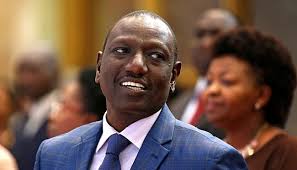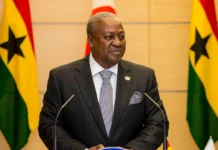Kenya is facing a critical moment as protests against a controversial finance bill have escalated into what President William Ruto is calling “treasonable” acts. The East African nation has been gripped by youth-led demonstrations for the past week, but events took a dramatic turn on Tuesday when protesters stormed the parliament building in Nairobi.

In a shocking display of civil unrest, demonstrators broke through the fence surrounding parliament, forcing lawmakers to flee through an underground tunnel. Once inside, the protesters unleashed chaos, tearing down flags, overturning furniture, and even setting fire to part of the building. The symbolic mace of parliament was seized during the invasion.
The unrest didn’t stop at the parliament. Shops and clubs associated with members of parliament were looted, showcasing the protesters’ anger towards the political establishment. In response, police used live ammunition and tear gas to disperse crowds in the capital city.
President Ruto, addressing the nation after these events, described the situation as a serious threat to national security. He accused “dangerous people” of hijacking what had started as peaceful protests against the finance bill. The president made it clear that the government would not tolerate such actions, stating, “It is not in order, or even conceivable, that criminals pretending to be peaceful protesters can rain terror against the people, their elected representatives, and the institutions established under our constitution and expect to go scot-free.”
Ruto emphasized the need to distinguish between legitimate democratic expression and criminal activity. He promised a full state response to the situation, reaffirming his commitment to protecting Kenyan citizens.
In a significant escalation, Aden Duale, the cabinet secretary for defence and chairperson of the defence council, announced that the Kenyan Defence Forces (KDF) would be deployed to support police efforts on the streets. This move signals the government’s determination to regain control of the situation.
However, the government’s response has not been without controversy. Reports emerged of police beating and arresting paramedics who were assisting injured protesters, raising concerns about the use of excessive force.
The root cause of these protests lies in a contentious finance bill, the details of which have sparked widespread dissatisfaction among Kenya’s youth. The bill’s specifics and the government’s handling of economic issues have clearly touched a nerve in a country grappling with various economic challenges.
As Kenya faces this crisis, the world watches closely. The coming days will be crucial in determining whether the government can find a balance between maintaining order and addressing the genuine concerns of its citizens. The deployment of military forces and the president’s strong rhetoric suggest a hard line approach, but it remains to be seen whether this will quell the unrest or further inflame tensions.
For now, Kenya stands at a crossroads, with the actions of both protesters and the government likely to shape the nation’s political and social landscape for years to come.




